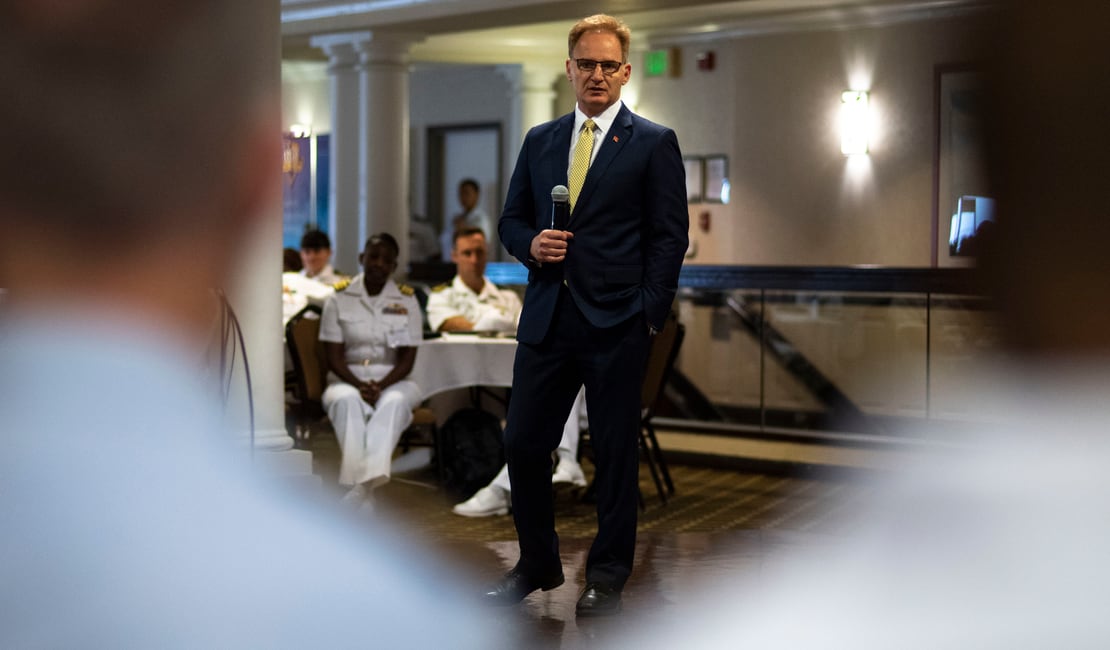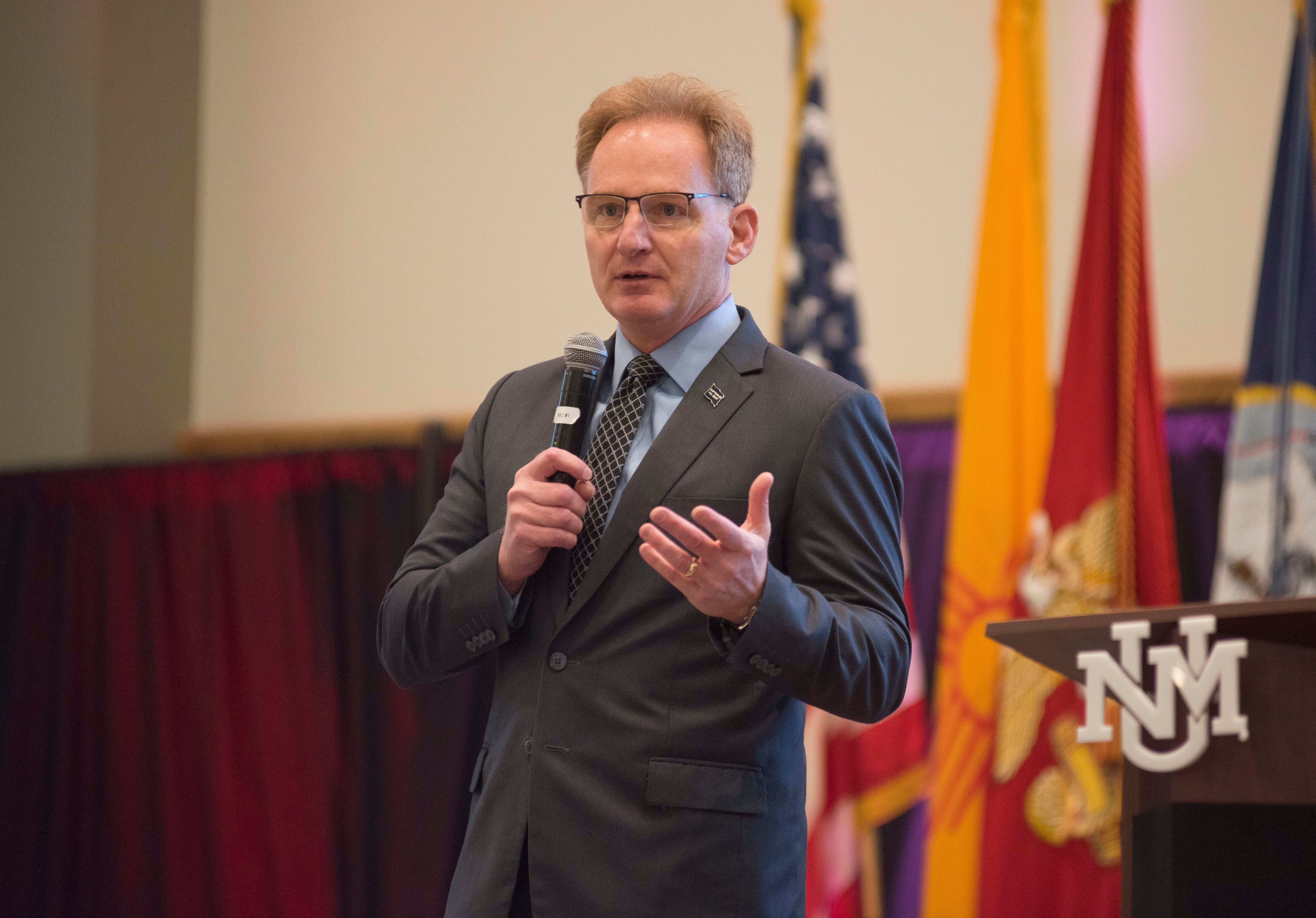Acting Secretary of the Navy Thomas Modly resigned Tuesday, capping perhaps the most tumultuous 24-hour public relations fiasco the sea service has ever encountered.
Defense Secretary Mark Esper confirmed Modly’s resignation in an official statement, saying, “He resigned on his own accord, putting the Navy and the Sailors above self so that the U.S.S. Theodore Roosevelt, and the Navy as an institution, can move forward,” Esper said in an official statement.
“His care for the Sailors was genuine. Secretary Modly served the nation for many years, both in and out of uniform. I have the deepest respect for anyone who serves our country, and who places the greater good above all else. ... I wish him all the best.”
RELATED

Modly’s resignation comes less than 24 hours after numerous Democratic members of Congress called for his firing over his handling of the dismissal of Capt. Brett Crozier, the former commanding officer of the aircraft carrier Theodore Roosevelt who penned a leaked letter pleading for U.S. intervention to stifle a COVID-19 outbreak on the 4,800-person ship.
As his last act as Navy secretary — before James McPherson, who was confirmed as the Army’s number two official just 15 days ago, takes over the newly vacated role — Modly distributed one final memo to the fleet.
The text of that letter, in its entirety, is as follows:
Before I start I want you all to know that I never, ever thought Vector 19 would be my final vector to you. I actually thought it was going to be around Vector 9! That being said, I am incredibly honored to have ever had the chance to have written even Vector 1.
This past week has been what I have been talking to you about all along — what we can best predict about the future is that it will be unpredictable. No doubt you have all monitored the events this week which placed our Navy in the spotlight in a negative way—largely due to my poor use of words yesterday on the USS THEODORE ROOSEVELT (TR). You are justified in being angry with me about that. There is no excuse, but perhaps a glimpse of understanding, and hopefully empathy.
I have been monitoring the crew of the TR and all of ships with coronavirus (COVID-19) cases closely. I have personally spoken with the Commanding Officer (CO) of every ship and installation in which we have such cases. When I walked on the quarterdeck of the TR I lost situational awareness and decided to speak with them as if I was their commander, or their shipmate, rather than their Secretary. They deserved better, and I hope that over the passage of time that they will understand the words themselves rather than the manner in which they were delivered. But what’s done is done. I can’t take it back, and frankly I don’t know if I walked back up that quarterdeck today if I wouldn’t have the same level of emotions that drove my delivery yesterday.
The crew deserved a lot more empathy and a lot less lecturing—I lost sight of that at the time and I am deeply sorry for some of the words and for how they were spread across the media landscape like a wildfire. I had hoped to transmit a message of love, and duty, and mission, and courage in the face of adversity. Those words are in there, but they are now lost, because of me, and I will regret that for the rest of my life. But, I am not a football head coach, or a master chief, or even the ship’s own CO, I am the Secretary of the Navy and you, and they, should expect more out of me. I own it.
I realize that I have consistently told each and every one of you “Don’t Ever, Ever Give Up the Ship.” That is why it is very important for me to communicate to you why I have submitted my resignation today. We all have to understand what our ship is. I love the Navy and Marine Corps. I love our country, and I love you. You are all on my one big ship. But the ramifications of mistakes, even simple ones, when someone is charged with protecting a ship that large and that important can be fatal. It is not just missiles that can take us down, words can do it too, if we aren’t careful with how and when we use them.
My lack of situational awareness due to my emotions of the moment did the exact same thing to MY ship, as I would hold you accountable for as you lead yours. I brought incoming fire onto our team and I am convinced that the fire will continue unrelentingly until the target is gone. I know what I have to do save the ship. I have always tried to do the right thing for all of you. Always. I never cared about the title, I cared about the relationships. I trust you all know that and that you know how terribly sad I am right now that I disappointed you by not keeping our ship out of harm’s way. It’s my fault. I own it.
Now on to the vector:
In the classic hard rock satire “rock-umentary” movie called “This is Spinal Tap,” there is a scene in which the lead guitarist, Nigel Tufnil, played by Christopher Guest, is explaining how their band is able to take their sound to the next level. He shows the interviewer, played by Rob Reiner, the Spinal Tap amplifiers and explains that instead of going to volume level 10 like all other traditional hard rock amplifiers, Spinal Tap’s amplifiers have an extra level of volume— volume level 11. The interviewer says, “well instead of having 11 why don’t you make each individual level just a little louder than the traditional amplifier—so you know make the 1 a little louder, the 2 a little louder, the 3 a little louder, etc., up to 10?” Nigel looks at him with the apparent inability to grasp the concept of doing something different than the way he has always done it. He pauses, dumbfounded, and simply says, “But, these go to 11.” https://www.youtube.com/watch?v=KOO5S4vxi0o
Does this sound like a familiar story to you? How many times in your Navy or Marine Corps career have you thought about, or even suggested, a different, better way of doing things and the response has been, “Well, that’s not how we do it?” I guarantee that this has happened to you more than once. If not, you must not be in the Department of the Navy and you should not be on the distribution list for this email!
Don’t worry, this happens everywhere. People and organizations are resistant to change. Change is uncomfortable. The important point is that phrases like “this is how we do it in the Navy” or “this is how we do it in the Marine Corps” can be dual-edged swords. There is great value in stability, in tradition, in order, in a consistent way of doing things that we must respect and appreciate. But when it stifles the characteristics of agility that I have spoken to you about before (velocity, visibility, adaptability, innovation, collaboration, trust, humility, and skepticism), those same “this is how we do it” phrases can erode a team’s ability to win in a dynamic and rapidly changing environment - like the one that we are in.
I want to focus on one of these characteristics specifically this week: visibility. Visibility is all about communications up, and perhaps more importantly, down the chain of command. Visibility is also about knowing when and how to appropriately consult and communicate laterally across the organization. For our Navy and Marine Corps team, it must never be about sharing operationally sensitive information for the world to see about your ship, your unit, your acquisition program, your team, your concerns about readiness, your personal views about your command, etc.
In my previous line of work with a big consulting firm, we prided ourselves for being a learning organization. We had training and learning requirements that put us through a variety of different legal, moral, operational, customer, ethical, and leadership challenges. As each challenge was presented, and possible answers discussed, invariably the first thing that was cited that we should do was to “consult.” This did not mean go out and sell a consulting project to a client, rather it meant “consult” with others across the organization, up and down, to seek the best solution to specific problems. It was amazing to me how empowering this was. How much I could learn if I put myself out there to seek it without fear of retribution or resentment.
In 2010, with that same firm, I was leading a project team in Baghdad assisting U.S. forces with the economic development mission in the country. Out of the blue, in the spring of 2010, my DoD client asked us to split the team and send half to Afghanistan to help the Ministry of Mines develop an official tendering process for its minerals industry. This is a process nation’s use to sell national mineral rights to mining companies. No one on that team had any experience in mining, but the request was urgent. We “consulted.” I reached out broadly to my partners in the US firm, who connected me to our US mining practice leader, who then connected us to our global mining practice leader in London, who then connected us to the most experienced team in the world, with respect to tendering in lesser developed countries. Within days we had the most experienced team in the world engaged in Afghanistan. “Consulting” works. It empowers teams. It is a force multiplier.
In the military culture we must sustain the sanctity of the chain of command. But in the information age in which we all live, that sanctity is only useful to our mission if we use that chain for frequent communications up and down, even if this means skipping steps down if you are the highest responsible person at the top of that chain. The world is moving too fast to do otherwise.
The events of the last several weeks with respect to my decision to relieve the CO of the USS THEODORE ROOSEVELT indicate to me that we have some work to do in this regard, so you must pick up the mantle and fix this. No person should ever be afraid of bringing up issues of concern to their immediate superiors through an established and well understood path that respects both the chain of command and our own individual duty to fulfill our oaths. And, no commander should ever resent or discourage anyone senior in their chain of command from reaching down to gain better situational awareness from the people closest to the problem. That being said, there is a proper, courteous, and respectful way to do this that we must adhere to, especially during times of crisis.
I know we can do this, it just takes a willingness to recognize it is important. And the next time someone says to you “that’s not the way we do it”, think to yourself, “these go to 11”, smile politely, and then apply yourself even harder to seek a better way.
I love you all. Know that every second of every minute of every hour of every day of my time leading you has been an honor and a privilege, and I grateful for your friendship, mentorship, and willingness to listen and act on my behalf.
You know what to do. Take the helm. It’s your ship now. Don’t ever, ever, ever give it up. And forever, Beat Army!
J.D. Simkins is the executive editor of Military Times and Defense News, and a Marine Corps veteran of the Iraq War.




